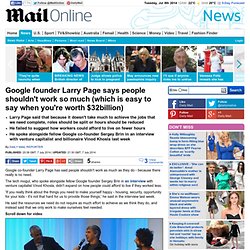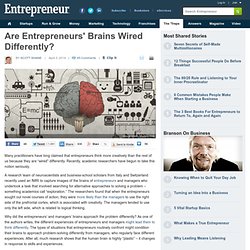

Google founder says people shouldn't work so much (which is easy to say when you're worth $32 billion) Larry Page said that because it doesn't take much to achieve the jobs that we need complete, roles should be split or hours should be reducedHe failed to suggest how workers could afford to live on fewer hoursHe spoke alongside fellow Google co-founder Sergey Brin in an interview with venture capitalist and billionaire Vinod Khosla last week By Daily Mail Reporter Published: 20:38 GMT, 7 July 2014 | Updated: 21:30 GMT, 7 July 2014 Google co-founder Larry Page has said people shouldn't work as much as they do - because there really is no need.

The tech mogul, who spoke alongside fellow Google founder Sergey Brin in an interview with venture capitalist Vinod Khosla, didn't expand on how people could afford to live if they worked less. 'If you really think about the things you need to make yourself happy - housing, security, opportunity for your kids - it's not that hard for us to provide those things,' he said in the interview last week.
AskMen reader details his five top tips for becoming wealthy. Sykes now lives a lavish lifestyle and travels around the world.

Source: Instagram EVER since I was a young boy, I wanted to be rich. I tried all sorts of childhood schemes like trading baseball cards, making handmade jewellery, even selling used tennis balls; none of them were very successful. After a sports injury sidelined me from high school life, my parents gave me control of my bar mitzvah gift money of roughly $12,000, thinking I’d lose it all in the stock market.
Instead I studied endlessly, became a master stock trader and turned my $12k into nearly $2 million by the time I graduated college and started a hedge fund. I’ve always had a big mouth, so by showing off my rather blessed life in the hit reality show Wall Street Warriors, I began getting 50, 100, 200 emails/day from people who also wanted to get rich in the stock market. So I made the odd choice of closing my hedge fund to start a media company focused on educating people on how to get rich in the stock market. 10 Popular Affiliate Programs for Small and Medium-sized Blogs.
Subscribe to ProBloggerPLUS!

Each week I'll write to you with our latest tutorials, tips and tools to help you build a better blog! As we’ve already seen today, affiliate marketing is a relatively trouble-free way for bloggers and other website owners to earn money. In fact, these days, even social media sites can become lucrative platforms for affiliate marketing campaigns. Because affiliate marketing doesn’t require affiliates to offer their own products or services for purchase, but only to place promotions on their sites for other merchants’ products, it frees affiliates from many of the responsibilities and complications of traditional sales models.
Affiliate networks administer programs for individual merchants, handling all the work involved, while generally providing tracking and reporting capabilities to their affiliates to help them keep tabs on their revenues and determine which products or services are producing the best returns. 1. 2. 3. 4. 5. 6. 7. 8. 9. 10. Trusted Tradie. Trusted Tradie. Inbox (29) - alivematrixforum - Gmail. Are Entrepreneurs' Brains Wired Differently? Many practitioners have long claimed that entrepreneurs think more creatively than the rest of us because they are “wired” differently.

Recently, academic researchers have begun to take this notion seriously. A research team of neuroscientists and business-school scholars from Italy and Switzerland recently used an fMRI to capture images of the brains of entrepreneurs and managers who undertook a task that involved searching for alternative approaches to solving a problem – something academics call “exploration.” The researchers found that when the entrepreneurs sought out novel courses of action, they were more likely than the managers to use the right side of the prefrontal cortex, which is associated with creativity. The managers tended to use only the left side, which is related to logical thinking.
Why did the entrepreneurs’ and managers’ brains approach the problem differently? Related: Focus on Opportunity, Not Income Inequality Related: The Paradox of Generation Y. The 80/20 Rule and Listening to Your Inner Procrastinator. A decade ago, my friend Bill said, "Perry I've got a million-dollar idea for you.

There's just one catch: If you sell a million dollars, you have to give $10,000 to my favorite charity. " "OK Bill, you're on," I said. He insisted I was leaving tons of money on the table by only writing and publishing books. He advised me to expand into business coaching. I decided he was right. I recognized the inner procrastinator as a signal that I was precisely on the right track.
That move doubled my income. I'm a passionate advocate of the 80/20 rule, which says 80 percent of your sales come from 20 percent of your customers.